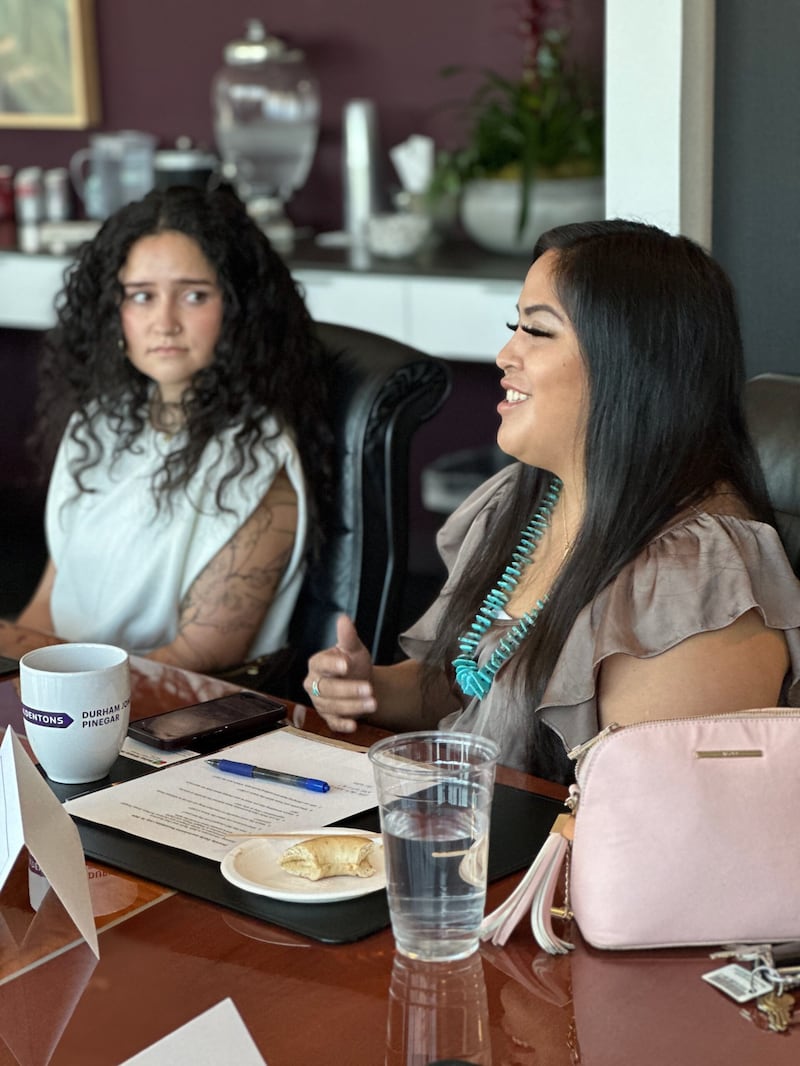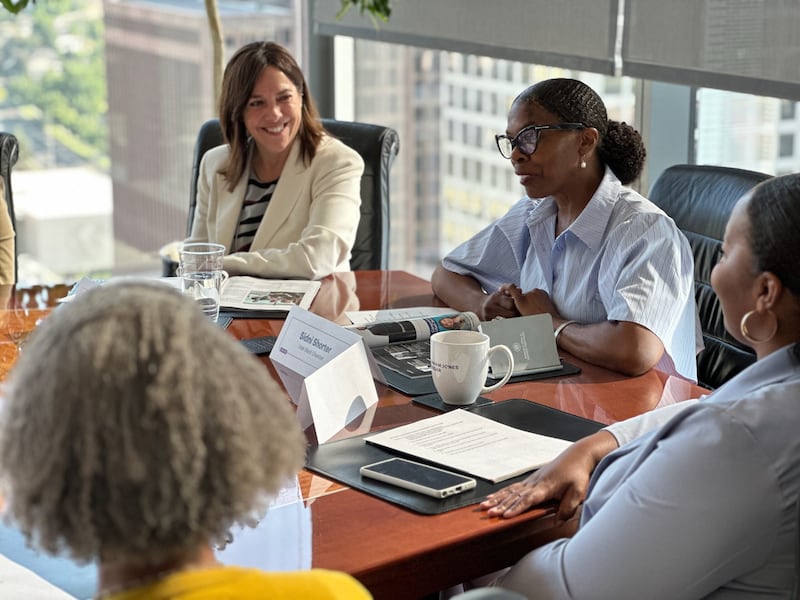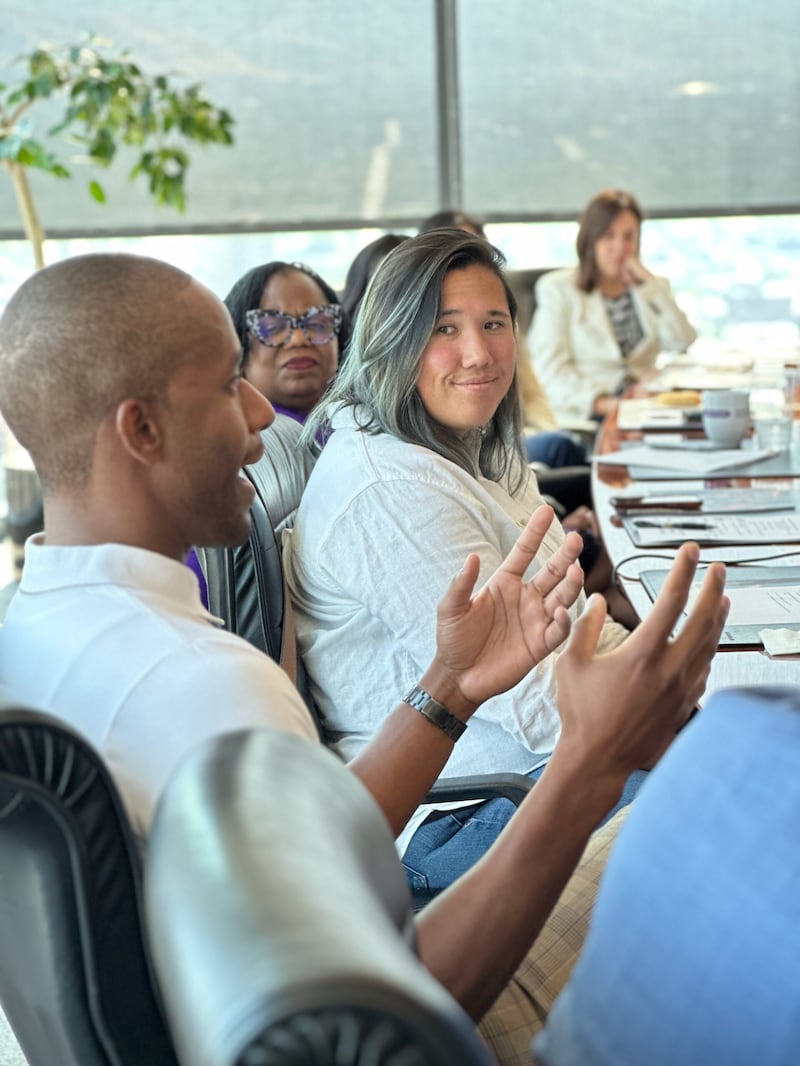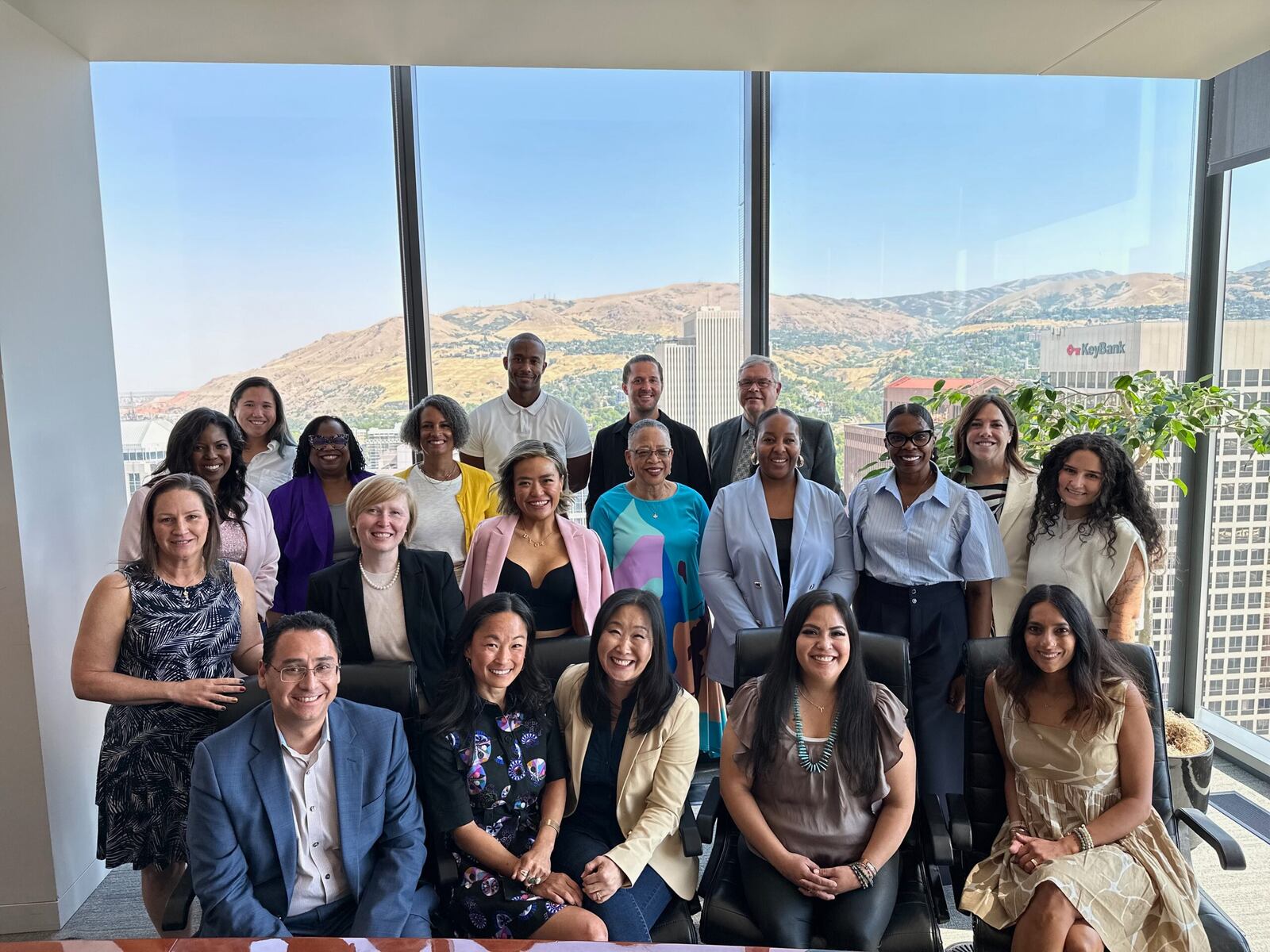This story appears in the August issue of Utah Business. Subscribe.
Last month, Utah Business partnered with Dentons Durham Jones Pinegar to host a roundtable featuring Utah’s diversity, equity and inclusion [DEI] leaders. Moderated by Maggie Roque, director of diversity, inclusion, belonging and equity at Zapier, participants discussed engaging the next generation, harmful practices, accountability and more.
What do we think is the future of DEI in Utah? What do we want for that future?
Emma E. Houston | Assistant VP for Community Engagement | University of Utah
When we look at the world we live in — our corporations, colleges, universities — we stray away from our vision. … We are an organization that respects individuals, that [is] inclusive, that celebrates all you bring to the table. Sometimes, we attach DEI to a person, a theme, a premise, … but these are our values for how we work. … If we see people as individuals, helping them elevate to the next level, we can eliminate those labels.
Connie Washington | VP, People Partners & DEI | Progressive Leasing
We have six ERGs (Employee Resource Groups), and they really are the drivers of our DEI. It’s just the way it is. Somebody said, “I would really like to see more meat with what the ERGs are doing.” And it pricked my heart because I realized it’s been a little fluffy. … We do get a lot of sentiment [about] how [employees] value the ERGs, and they’ve never worked in a place that’s had that, … but it’s not enough. They need some tangible things to strengthen them as people who have to do this and who are fighting the fight as well.
Dr. Tamara Stevenson | VP, Diversity, Equity & Inclusion; Chief Diversity Officer | Westminster University
Diversity, equity and inclusion is like energy. It cannot be destroyed. It can be transformed, it could be applied in different ways, but it would never go away. … Those Utah businesses [that] reacted instead of responded four years ago are feeling the ebbs and flows in a worse way than those who have stayed ready. … If you’re having to ramp up because you’ve been lackadaisical in how you’ve been operating, your consumers, your employees, your staff and your students are going to go where they are celebrated and not just tolerated.
Sara Jones | Founder & CEO | InclusionPro
When policies come down and they say, “You can’t do DEI in a certain sector,” that puts the burden on another sector. … For private businesses, … they’re taking on an educational burden that should have happened years and years and years ago. … I would love to see an ecosystem where everybody understands their role and … we’re sharing the work so businesses can do their business.
Shaleane Gee | Chief Officer, Culture + Community | Zions Bank
If, as an organization, you think of DEI as a sales strategy or a marketing strategy, you are causing damage to individuals and communities and probably your organization because you’re missing the point of what’s at stake. That’s something we feel very strongly [about]. It does go to values and how you represent those values at your organization. To the degree that it becomes performative, that’s harmful. And to the degree that it becomes performative as part of your sales strategy, that becomes extremely harmful.

How do we need to change as DEI leaders in Utah to get us closer to this vision?
Chelsey Nez-Marino | Program Director | Utah Native American Chamber of Commerce
It’s about how we organize, how we can take control of the language, and how this is going to move forward.
Taking away DEI is beneficial for us because then we’re saying, “If you guys are going to take away that educational portion on your end, then there needs to be accountability on the company’s end. … If we’re not going to do it in a way where it’s inclusive and everybody’s educated, then we’re going to move toward something where there’s a metric for how well people treat other[s].”
Chad Call | Executive Director | Utah Pride Center
When you talk about what we want next or what our next steps are, we have to be really blunt. Maybe this is low-hanging fruit, but I want to be able to say the words diversity, equality and inclusion in our schools, in our cities, in our governments and in our business[es]. Maya Angelou said, “Do the best you can until you know better. And when you know better, do better.” We know better. We are at the place in life where we know better, and we now have to do better.
Cindy Chia | Founder | Aspire Psychological
I want to be proactive. I don’t want to be reactive anymore. We don’t need to wait for someone to die to train our employees. I want to inspire. I want to engage. I want to educate.
Mooncake Festival is coming up. We engage my daughter’s friends and do lanterns and things like that. … I want to be proactively changing that ignorance. I want to dig in a little bit. I want to bust through that wall a little bit. I think a lot of it is not ill will [or] intention. It’s just not knowing, not having that exposure.
Donald Cherry | Executive Director, Corporate Sustainability; Diversity & Inclusion Chair | USANA Health Sciences
It goes back to … the disconnect between the vision and the values and what we’re actually doing. I look at a lot of us organizationally; this work started in a very tumultuous time. A lot of us hit the ground running. … I wasn’t given the structure of an actual department to build some of the things that I actually needed to build. I’m taking a step back and looking at … the structure in place that allows me to accomplish the vision of what I think we’re setting out to do.
Bailey Rivera-Wymes | Special Project Manager | The Center for Economic Opportunity & Belonging
In some DEI programs, we can unintentionally leave out some folks [who] we may not think their perspective or experience are needed. One way we can move forward … is [by] building a container where we can have these cross-sector, cross-generational, cross-ability conversations of how to practically approach these things and move forward together in a respectful way. … We need to make sure that we’re including everyone in the conversation.
Nikki Walker | Founder | NWPR & Consulting
I remember doing a speech in Park City and saying my hope was that one day I would not do DEI speeches because it [would be] a part of the internal makeup of each organization, and our children [wouldn’t] have to come to DEI symposiums because it is part of who they are. Diversity, equity and inclusion has a bad publicist. When we’re talking about whose responsibility it is to hold other people accountable, we have to be accountable to ourselves to make sure that we are sharing the message in ways and in places that it is going to make an impact and a difference.
Shawn Newell | Director | Waves Enterprises
How do we convey the message that you’re not going to be attacked when you show up? You’re not going to be ostracized; you’re not going to be pointed out as someone [who] is a contributor to the issue. … We want to embrace you so you can manage and run your corporation in a way that is conducive to including diversity, inclusion and equity as part of your DNA as a leader.
Latonya Howell | VP, Human Resources | Tafi
In my role as an HR executive, I’m accountable [for] making sure there are equitable policies and practices in place. I influence those. I write those for my company, but I also feel a sense of responsibility to make sure employees know their rights when it comes to diversity, equity and inclusion. I use my area of influence to make sure I’m educating employees. … Whatever your area of influence is, you’re accountable for that.
Sindee Savage | Director, Community | V School
It starts at home. It starts [with] how we teach our families and our children. This is a slow burn. … But generationally, lots of change isn’t going to happen until some generations are no longer here. My daughter, for example, [is] 21 years old. I’m so excited for [her and her friends] to get into the leadership positions and figure out what they’re doing, but as a mother and as a woman in tech, I can be an example of how to do that.
Dr. Sidni Lloyd-Shorter | CEO & President | Utah Black Chamber
I’m going to go back to the humanity side: relationships. That’s how we all, as humans, function. The core value of how we move things forward is based on relationships.
There is an organization that we have been in conversation with and building a relationship with for over a year. The first conversation I had with them about diversity, equity and inclusion — I could not get in the building. Security told me I was in the wrong place. … I shared with [the C-Suite] my experience at their front door, but I also shared with them, “Don’t admonish [the security guard]. He’s a reflection of the culture that already exists.”
Inviting folks into a room to almost feel like they’re being admonished is a tactic that doesn’t work. … If it takes a year to build that relationship, to have that conversation where now they are listening to hear and then respond and take action, that’s what we want.

What comes to mind when talking about data and dollars in DEI?
Richard Knudson | Anti-Harassment Program Manager | Hill Air Force Base
Even in the federal sector, there is a business case for … establishing cohesive teams in the workplace that get the mission done. … The true assessment of success is whether we have a more diverse workforce. Are we more cohesive? Can we get the job done better? [Is] that diversity we spent a lot of time recruiting here a year from now? What is their experience in the workplace with regard to trust in all of these things?
Ross Romero | CEO | Inclusion Strategies
Member | Utah Hispanic Chamber of Commerce’s Advocacy Committee
I am very concerned that we spend too much time talking about entry-level positions and hiring. We’re not talking enough about making sure there’s diversity throughout the strata of an organization. We’re doing a good job putting effort and emphasis in that entry, [but] then they’re not rising to mid-level management or senior management. That’s a problem. When we talk about data and accountability, that needs to be part of how we communicate with the organizations we’re serving.
Lisa Duckworth | IDEA Director & Military Community Ambassador | Utah SHRM
The military sees the value of asking, “What religion are you?” Then, they provide support services for certain faith groups. … If they figured it out, why can’t we maybe incorporate that a little bit more? … There could be data collection of even what’s your preferred religion whenever we’re onboarding. … There’s a lot of value to collecting the data and then doing something about it, providing the support systems however we can.
Bailey Rivera-Wymes | Special Project Manager | The Center for Economic Opportunity & Belonging
The conversation around the economic benefit and data behind why organizations and groups should be diverse kind of makes me angry at this point. … The business case has been made. We have the data. We have the reasonings. We also have the human-value reason why. … The American Immigration Council [has] a whole toolkit. … We created a Building Belonging toolkit for Utah specifically. … There are all of these resources; people just aren’t utilizing them.
What are you hopeful for in the next 12 months with DEI?
Neelam Chand | Founder & CEO | Shift SLC
I’m really hopeful for more of these conversations with mixed generations because that’s really cool to see. We have a whole mix of generations willing to listen to each other and problem-solve.
Connie Washington | VP, People Partners & DEI | Progressive Leasing
I see six Black women [here]. I didn’t see that growing up. Two are doctors, three are VPs, one is a business owner. That brings me hope. I didn’t think that could ever happen growing up here. … I hope our kids are watching. Whatever they want to do, whatever color they are, whomever they love, whatever their gender, whatever their religion, the world is their oyster.
Ashley Gregson | Attorney | Dentons
I am hopeful for a renewed focus on our values, the core values that built this diversity programming we’ve all been working on, and finding common ground rather than reacting out of fear or anger toward the changes that have been happening lately. … We as lawyers think about risk a lot, and … law firms are concerned about risk in supporting diversity initiatives because there have been lawsuits against law firms for having those recently. … Instead of reacting out of fear and dropping those things that we think may be too risky, [I hope that] we go back and reassess those core values. … Treating people with dignity and respect, not discriminating, not harassing people, we all agree those are good things. I’m hopeful that will give us a renewed and sustainable path forward.


